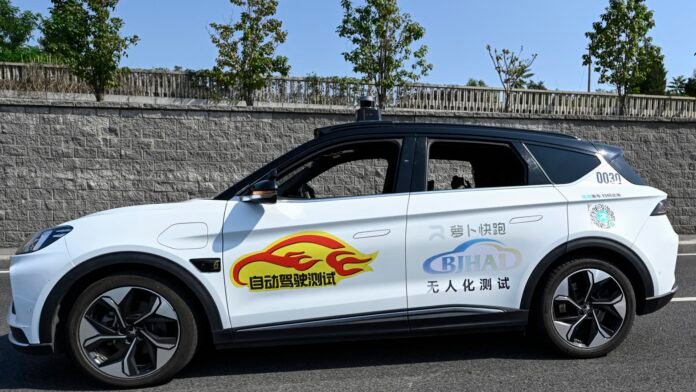[ad_1]
A driverless robotaxi autonomous vehicle developed by Baidu Apollo driving along a street in Beijing.
Jade Gao | Afp | Getty Images
SHANGHAI — Chinese tech company Baidu said Wednesday its Apollo Go robotaxi arm expects to turn profitable next year.
The projection comes as Elon Musk has emphasized his plans to build up Tesla’s robotaxi efforts amid a decline in revenue.
Baidu is one of the major players in China’s nascent robotaxi market and received permission from a Beijing city district to begin charging fares in November 2021.
While most of the cars still have a human staff worker inside for safety, the same Beijing district officially let Baidu and start-up Pony.ai charge fares for robotaxi rides with no staff in the vehicle in September 2023.
Apollo Go operated about 839,000 rides in the last three months of 2023, according to Baidu’s latest earnings report. The company is due to release quarterly results Thursday.
About 45% of the orders in the fourth quarter in Wuhan were fully driverless, up from 40% the prior quarter, the company said.
In addition to growing usage and reducing labor costs per ride, Baidu is making the cars cheaper.
Baidu on Wednesday announced Apollo’s 6th generation robotaxi will cost around 200,000 yuan ($28,169) — or less than half that of the prior generation, the company said.
This year, Baidu plans to deploy 1,000 of those 6th generation robotaxis in the city of Wuhan, where the company already operates a number of vehicles without any human staff inside.
“With decreasing costs and increasing orders, Apollo Go’s unit economics (UE) is nearing break-even, expected to achieve balance in the fourth quarter of 2024 and turn profitable by 2025,” Baidu said in a press release.
Rival robotaxi operator Pony.ai is preparing for a listing outside mainland China, according to the China Securities Regulatory Commission website in late April.
Others in the auto industry remain more skeptical about fully driverless cars, which require broad regulatory approval in order to operate.
Xpeng Vice Chairman Brian Gu told reporters last month he didn’t expect robotaxis to be a real business for at least five years.
[ad_2]
Source link

